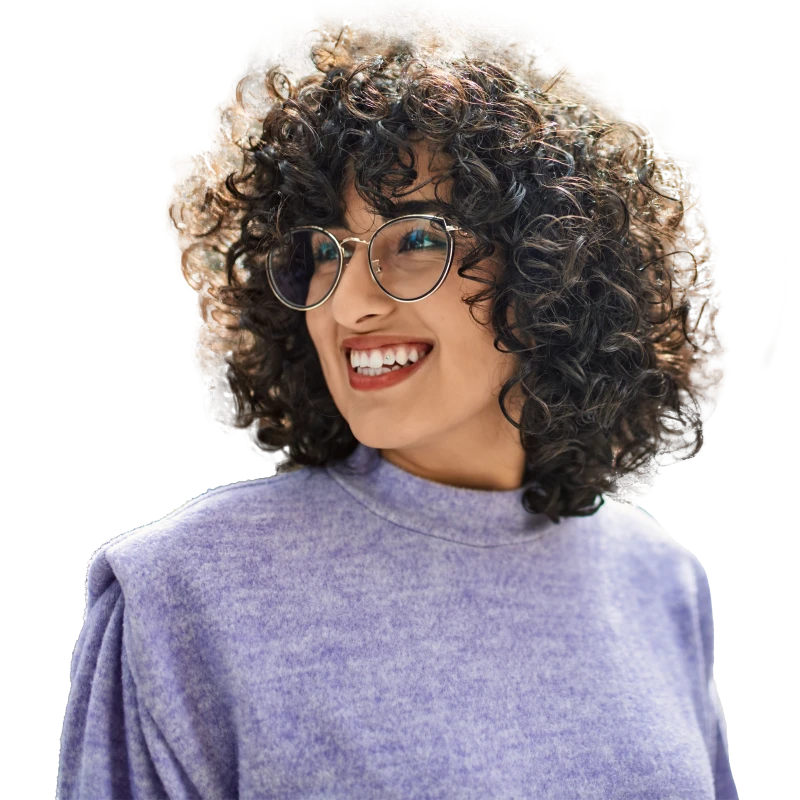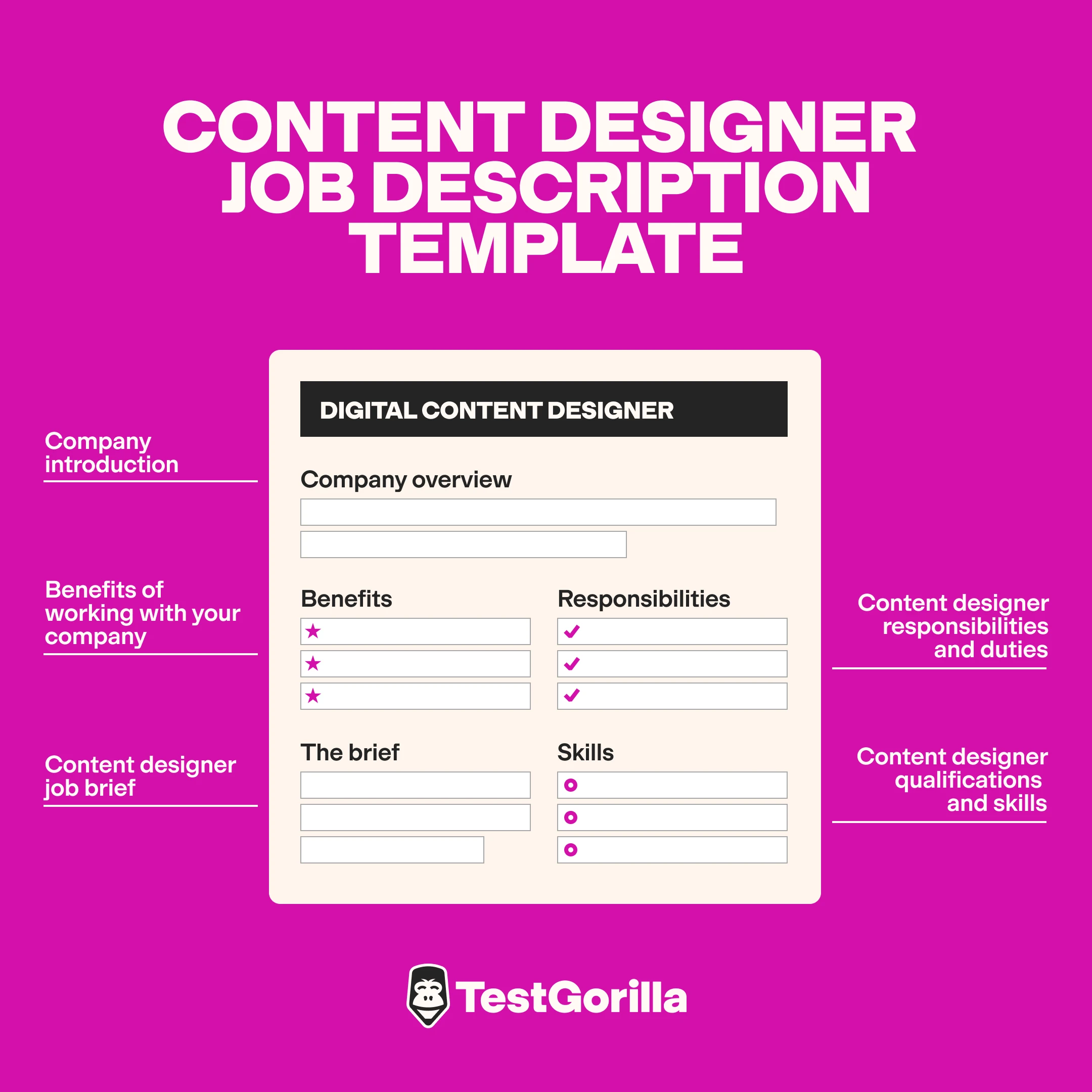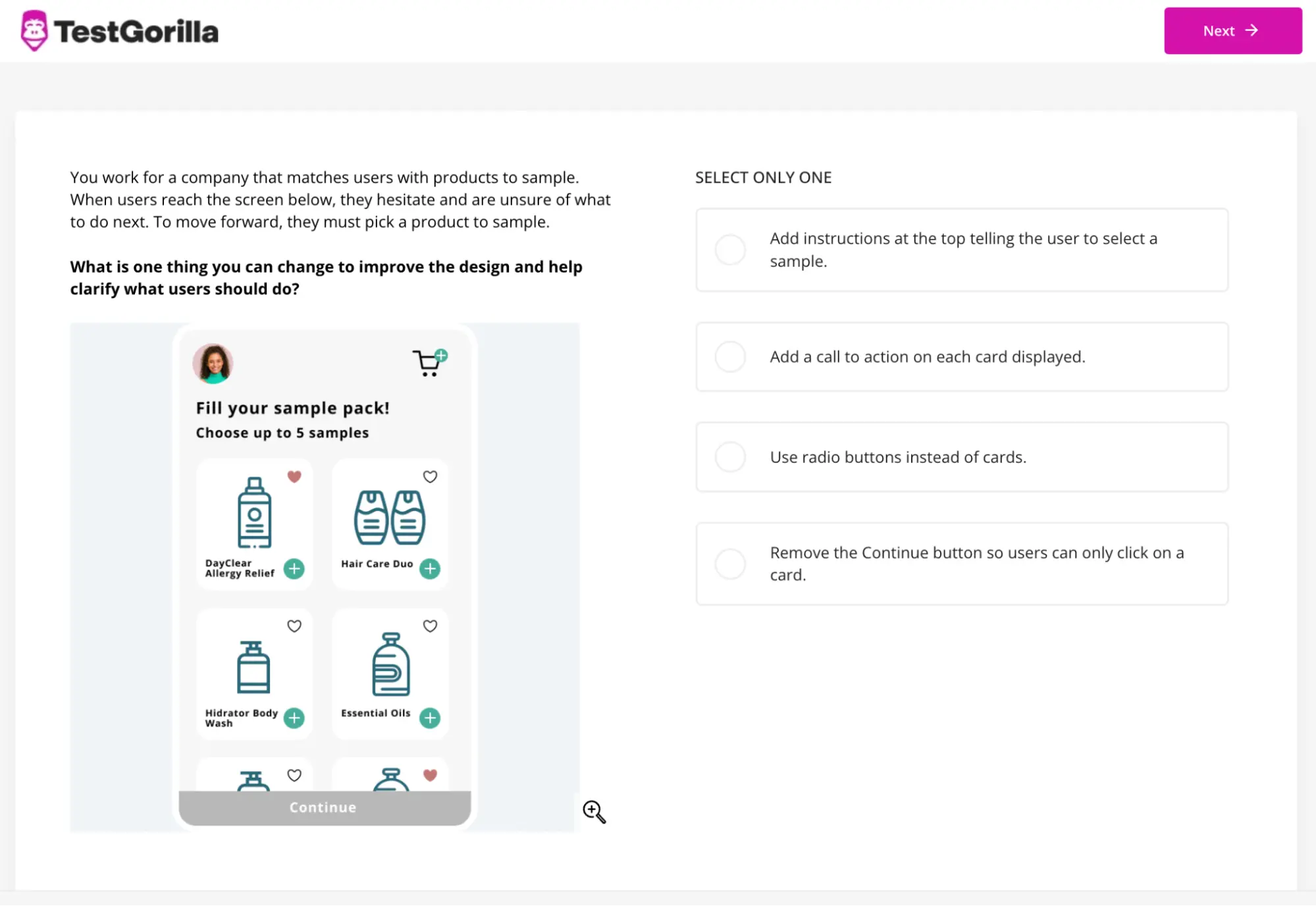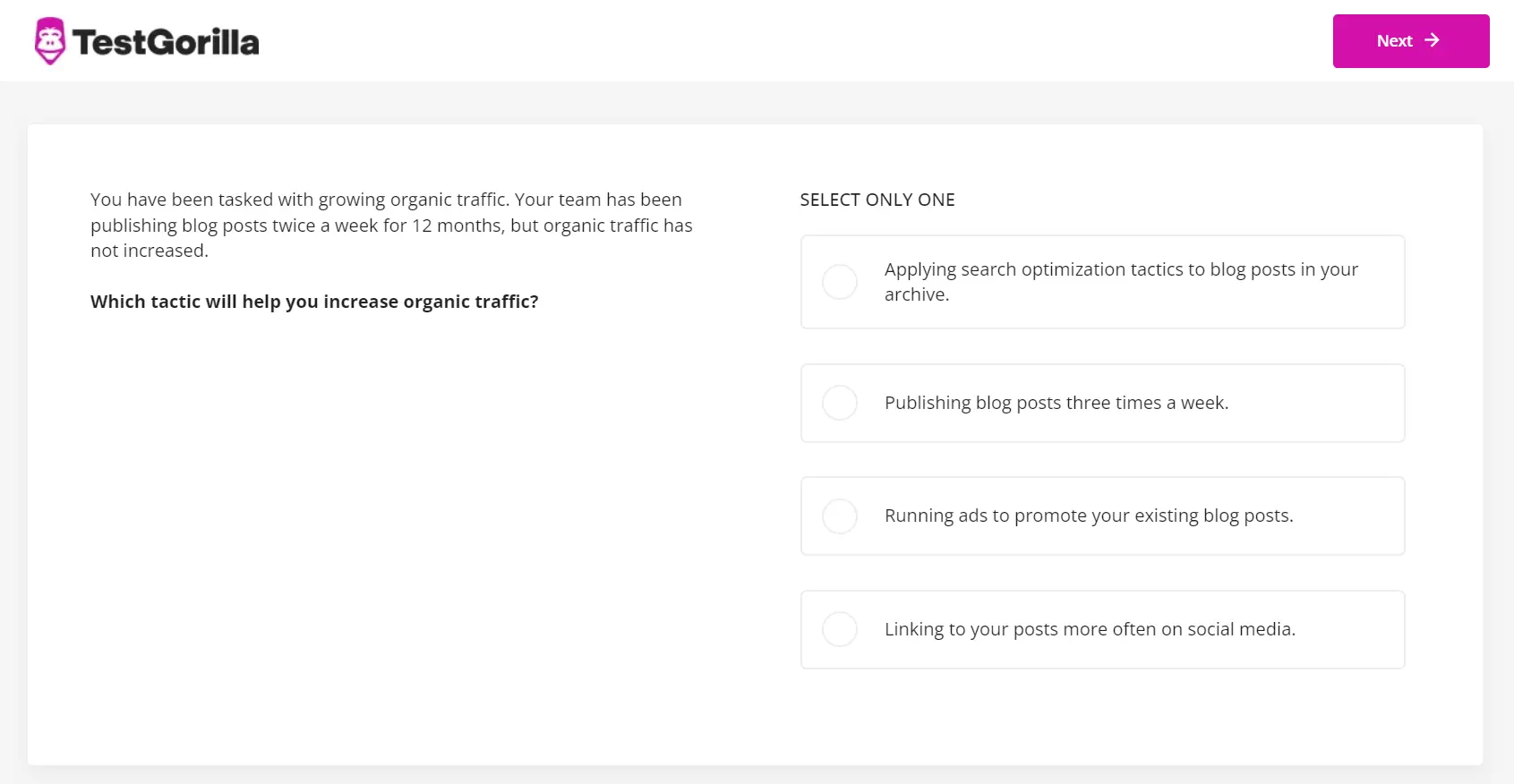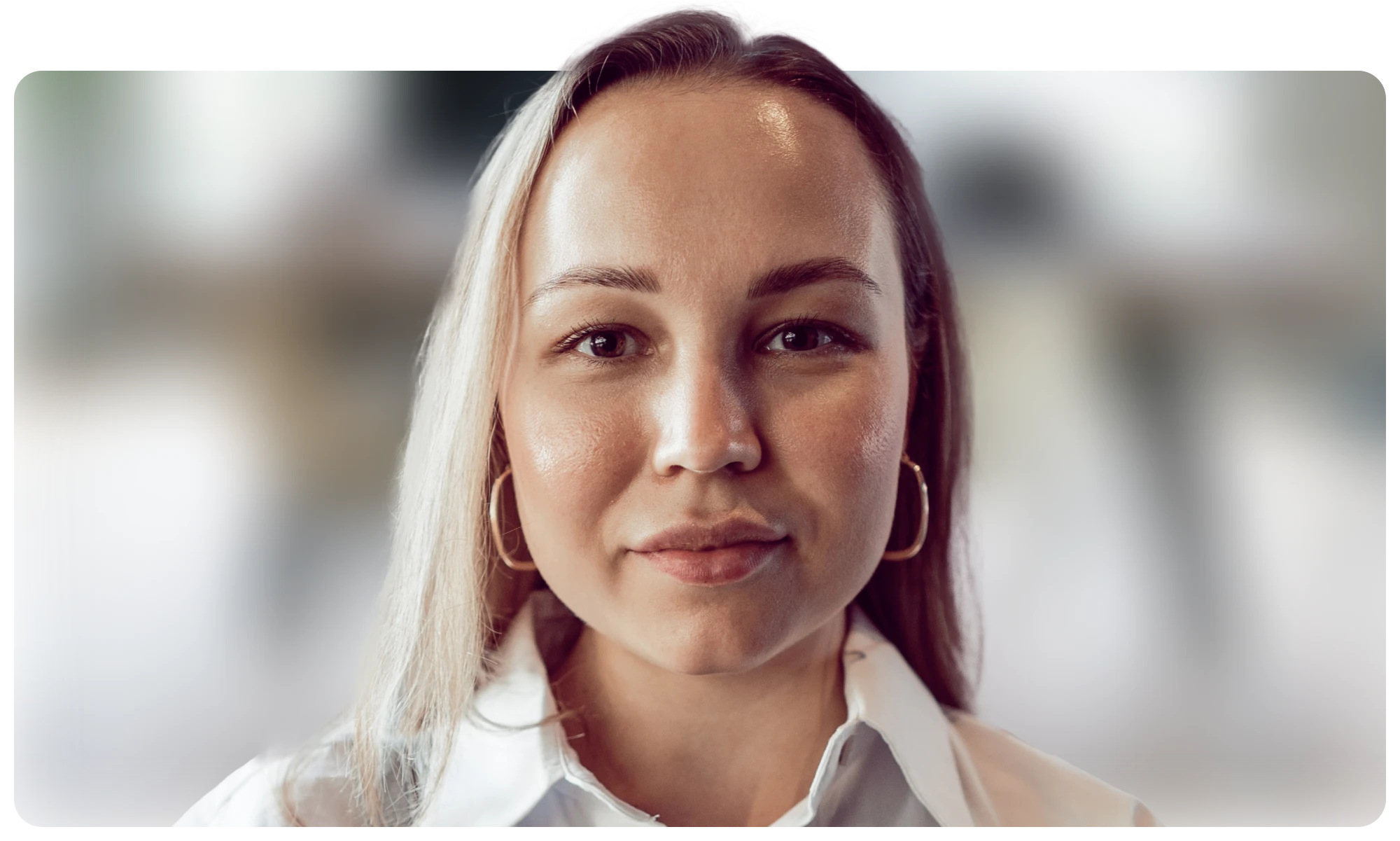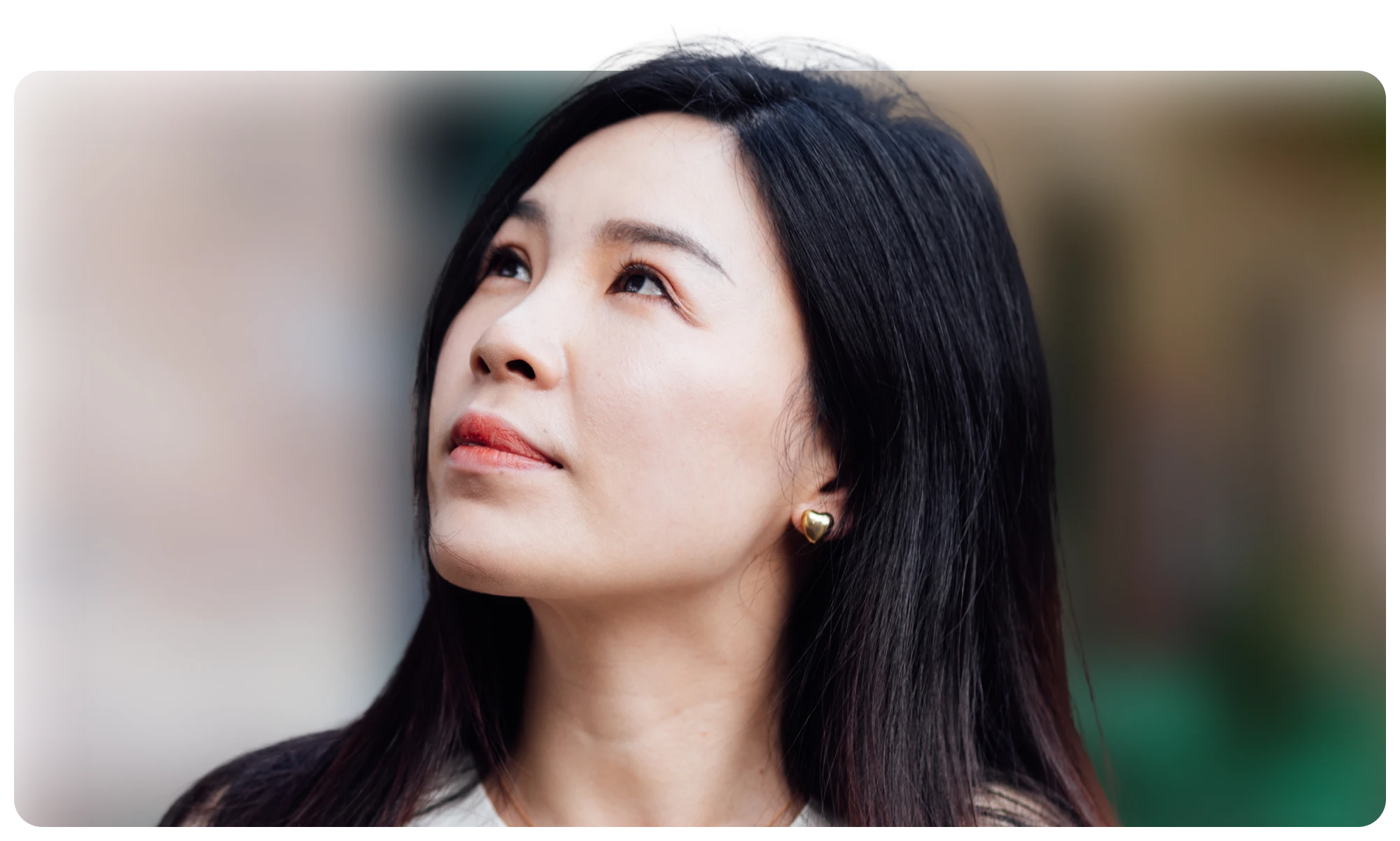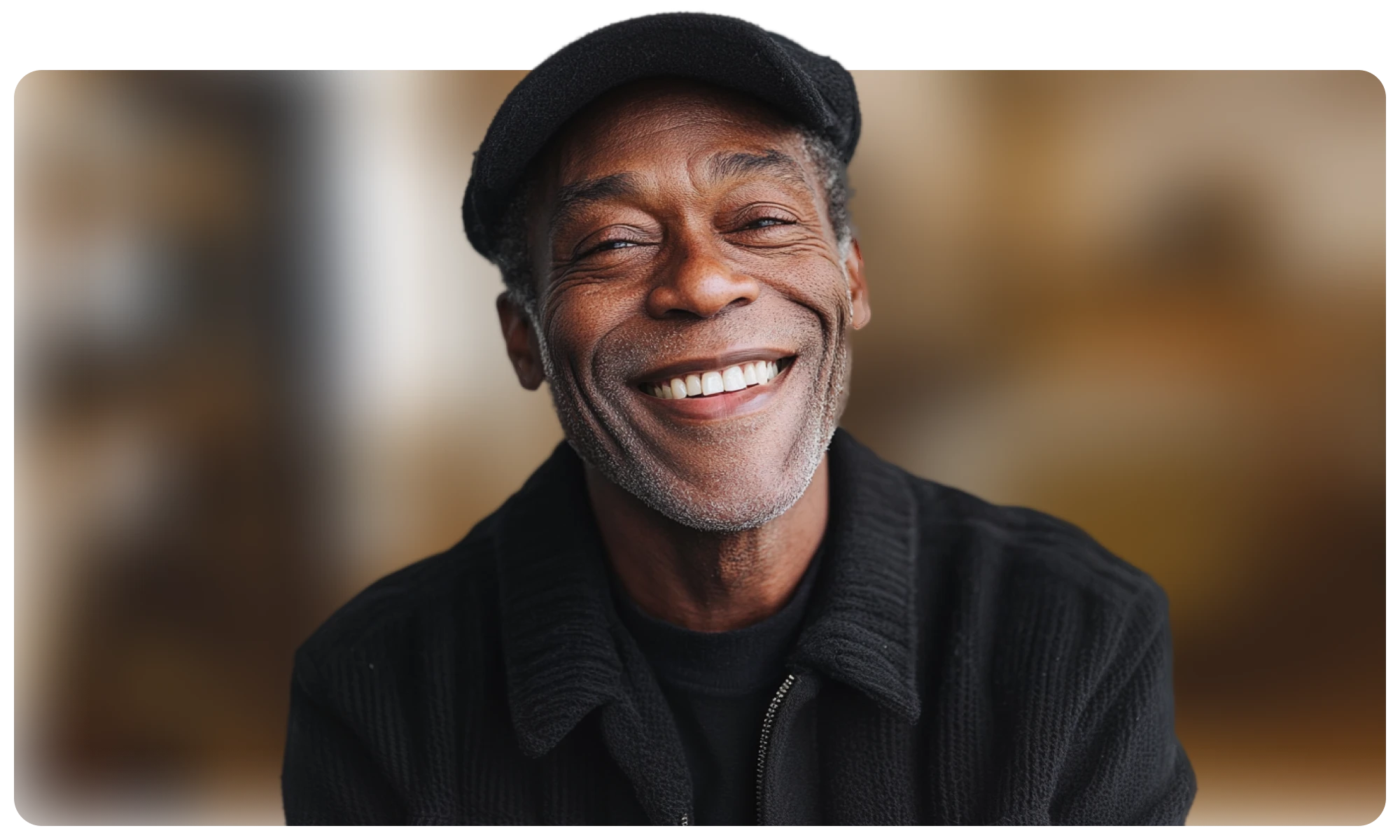Hire the best content designers with talent assessments
Nearly every business needs a strong content marketing strategy, and a content designer is key to making that strategy shine.
What does a content designer do? A content designer improves the user experience and accessibility of your content, from optimizing UX to copywriting.
This guide shows you how to write the perfect content designer job description, focusing on what matters most – skills, behavior, and culture – so you can hire the best.
We also discuss different types of content designers and their typical salary so you know what to expect.
Table of contents
- What does a content designer do?
- 14 key skills to look for in a content designer
- How to write an effective content designer job description
- Next steps: Attract and assess content designers with TestGorilla
- Build a great content designer job description and hire the best
- Content designer job description FAQs
What does a content designer do?
A content designer is responsible for building and managing content that’s accessible, user-friendly, engaging, and aligned with the needs of an organization and its target audience. They plan and strategize what content a company requires to meet user needs on various platforms, including websites and applications. This content includes blog posts, videos, infographics, or even quizzes.
Content designers combine creative storytelling with the hard data of user experiences to engage and attract people across many different digital platforms.
The typical content designer’s salary ranges from $77,000 to $139,000, averaging $91,000 per year. The estimated additional pay is $12,000 annually, which includes benefits like cash bonuses, commissions, and profit sharing.
Increasingly, more companies are writing content design job descriptions because of the sudden need for this role. In 2022, the global content marketing industry revenue was estimated at $63bn. The same report projected that number would reach $107bn by 2026.
Types of content designers
What does a content designer do? It depends on the type of content designer job description you’re writing.
Here are the main types of content designers:
UX content designer: Creates content that improves the overall user experience.
SEO content designer: Ideates and builds content that enhances visibility and ranking on search engines.
Content strategy designer: Guides the creation and distribution of content. A content strategist job description should emphasize consistency and critical thinking.
Technical content designer: Breaks down technical concepts into easy-to-understand content like user manuals, FAQs, and help guides.
Brand content designer: Builds content that promotes a company’s values, purpose, and image.
Knowing which type of digital content designer job description you’re writing also informs the interview process. For example, hiring a UX content designer requires web design interview questions.
14 key skills to look for in a content designer
Knowing how to hire a content creator starts with understanding the skills you need. Businesses face major challenges with their content:
50.5% struggle to find the right layout
43.8% have trouble consistently producing it
37.1% have issues producing great designs
30.5% struggle to source the right data
Content layout, consistency, design, and data depend on the right skills.
Let’s take a look at which ones you need to hire.
Content designer hard skills
Here are the top technical skills for your web content designer job description.
Hard skill | Description |
Research | A good content designer understands insights from qualitative and quantitative research is needed to make informed decisions |
Business strategy | Understanding your business goals and how to achieve them is essential when creating content |
User experience (UX) knowledge | Content designers must address your audience’s needs and wants with a smooth experience |
Prototyping | Visualizing ideas helps teammates and stakeholders understand their strategies and decisions |
Stakeholder relationship management | Regular, clear communication with stakeholders keeps goals aligned and mitigates risks |
Technological literacy in relevant software | It’s essential to know content design software for prototyping, user testing, user research, and content management |
HTML/CSS basics | Basic HTML skills help content designers lay out their content and make it accessible and attractive |
Content designer soft skills
Here are the soft skills you need to write a great digital content designer job description.
Soft skill | Description |
Communication and active listening | It’s vital to understand and interpret content needs through active listening and communicate complex concepts through the written word. |
Collaboration | Content designers often work in large teams with writers, editors, and designers. They also often work cross-functionally and collaborate with stakeholders. |
Openness to feedback | Being open and adaptable helps content designers create content that aligns with your brand and audience. |
Problem-solving | Acting on your toes to understand problems and find solutions helps content designers build high-quality strategies. |
Critical thinking | Content designers must identify areas of improvement and enhance them through user research and insights. |
Attention to detail | Attention to minute details helps content designers spot small flaws and gaps in fluid UX. |
Agility and adaptability | Digital teams must be flexible and adapt to market shifts, sudden needs, and new guidelines. |
The best insights on HR and recruitment, delivered to your inbox.
Biweekly updates. No spam. Unsubscribe any time.
How to write an effective content designer job description
Before we get to our template, let’s cover the three best practices for writing a content designer job description.
Take a look because these tips apply to everyone – whether you’re writing a creative content designer job description or a social media content description.
1. Clarify your needs and expectations
“What is a content designer?” is a question we often hear.
Many people aren’t entirely clear on what a content designer is, so be as clear as possible when writing your description. Include hyper-specific responsibilities and qualifications.
For instance, are you looking for a UX writer? Ensure you list the “UX Content Designer” job title and specific skills and qualifications so your ideal UX specialist doesn’t pass you by.
2. Focus on skills, not history
Content designers often come from varied backgrounds. They have a seemingly random history or no college degree because they jumped from content writing to copywriting to content design.
Focus on the right skills when writing a content designer job description – not experience and education.
Including tight restrictions limits your pool of content creators, but using skills-based hiring practices opens your recruitment process up to amazing, untapped talent.
Take our product tour to learn how talent assessments deliver top talent without relying on resumes.
3. Ask for a wide variety of work samples
Content designers must work on many different mediums, so your UX content designer job description must ask candidates for a variety of work samples, including web copy, microcopy, emails, and content writing.
Here are some examples of the type of work that you should look for in portfolios (courtesy of the HubSpot content design team):
Accessibility
Content auditing
Content testing
Inclusive language
User journey mapping
Localization
Notifications, tooltips, banners, and alerts
Product interfaces
Product or feature naming
Style guides
Voice tones and guidelines
Content designer job description template
Here’s our content designer job description template you can use for your next hiring effort. This handy template helps you standardize your recruitment process, reducing time and effort and enabling you to focus on your candidates.
Digital content designer job description: Company introduction
Use this section to introduce your company, including its name, purpose, values, and main services. You should also describe how content designers contribute to the company’s overall success.
Benefits of working with [your company]
Include the benefits of working for your company, such as flexible work, learning and development opportunities, and health insurance. Make sure to mention anything specifically relevant to content designers, such as upskilling programs in your marketing department.
Content designer job brief
[Company Name]
Job Title: [Content Designer / UX Content Designer]
Reports to: [Design manager]
Position Type: [Full-time, part-time, or contract]
Location: [On-site, remote, or hybrid]
[Salary and benefits information]
Content designer responsibilities and duties
Understand user needs through research
Build content strategies that align with audience needs and brand voice
Write and edit content to ensure clarity and accuracy
Guide content strategy and establishing best practices for content creation
Ensure content meets web accessibility standards
Maintain editorial calendars and managing content lifecycles
Conduct user research and testing to refine content strategies and increase engagement
Content designer qualifications and skills
A great content designer job description should have the following skills and qualifications:
Required skills and experience
Expert writing and editing skills
Knowledge of SEO best practices
Keen presentation skills
Excellent verbal and written communication
Expert understanding of user analytics
Deep understanding of content management systems
Agility and adaptability in a dynamic environment
Solid active listening and the ability to interpret audience and client needs
Preferred skills and experience
Product management and design skills and certifications
Basic HTML/CSS skills
Strong organization and time management skills
Two to four years of experience in content design
Bachelor’s degree in English, journalism, or communications
Next steps: Attract and assess content designers with TestGorilla
You now have a well-built graphic designer and content creator job description – it’s time to hire the best talent.
You can use LinkedIn or Glassdoor to find candidates with the best knowledge of design principles, design thinking, digital products, and UX research.
Let’s say you’re looking for a senior content designer. Once the candidates start pouring in, you need a data-driven way to discover your ideal hire: Talent assessments let the skills do the talking without resumes getting in the way.
Mis-hires aren’t just costly; they could also lead to a messy, ineffective content strategy. To make sure you get top talent, use skills tests like:
Content Strategy test
UX/UI Design test
Critical thinking test
Communication test
Culture Add test
Our UX/UI Design test gauges how a candidate addresses user needs and understands intuitive designs. This assessment discovers candidates who balance stunning visuals and smooth functionality.
See what this test has to offer by checking out these preview questions.
Our Content Strategy test objectively uncovers how a candidate connects to an audience and increases crucial traffic. Successful candidates show a strong understanding of every stage of the customer journey.
These tests enable you to accurately and fairly shortlist candidates and cut right to top-tier talent.
After you narrow it down, you need to invite the best candidates to interviews to learn more about their skills and personalities.
Check out our piece on product designer interview questions to get started.
Say goodbye to guesswork and sign up for our Free Forever Plan.
Build a great content designer job description and hire the best
Content is vital for your business strategy, and you can ensure it flourishes with a stunning content designer job description.
Examine the specific skills your role needs and focus on them in the content design job description and further into the hiring process. Top talent is at your fingertips if you assess what matters.
Sign up for our free forever plan to gain unlimited access to our Communication, Time Management, and Problem-Solving tests – three vital assessments for content designers.
You can also look at our product tour to understand how to go from a web content designer job description to a successful hire.
For a deeper look, book a demo with one of our experts.
Content designer job description FAQs
Let’s finish this content designer job description guide by answering three frequently asked questions.
Why hire a content designer?
Content designers shape, optimize, and manage a company’s content production and strategy. These professionals help drive digital traffic, create accessible, engaging user experiences, and maintain brand alignment. Content designers have a range of duties, including managing written content, modeling technical layouts, and ideating strategies with stakeholders.
Increasingly, more companies realize the importance of great content designers. When businesses dedicate 10% to 50% of their content efforts towards content design, they’re 33% more likely to report successful results.
What software do content designers use?
Content designers are typically proficient with word processors, Figma, content management systems, graphic design tools, and project management software. They also know content research software, video marketing tools, and content planning technology. In addition, content designers understand concepts like user interface, usability, interaction design, and iteration when they design systems.
Consider these tools while writing job descriptions for graphic designers and content creators because many overlap between different types of content creators.
Is a content designer the same as a UX designer?
A content designer role and a UX designer are often interchangeable terms for the same job. Some professionals specify that UX writing gives designers more control over the information architecture, while content designers focus specifically on a piece of content. Because the terms are nearly identical to most professionals, it’s important to clarify the skills you need in your content designer job description and then hire your new talent with talent assessments.
You've scrolled this far
Why not try TestGorilla for free, and see what happens when you put skills first.


